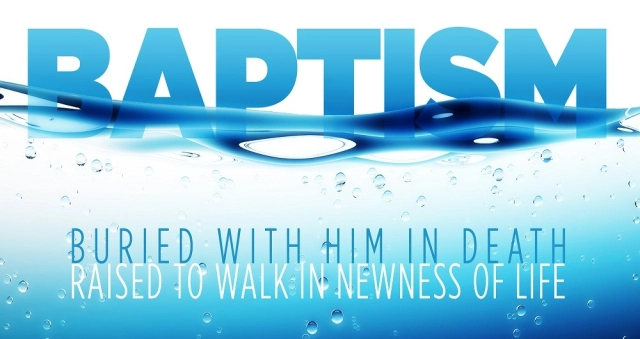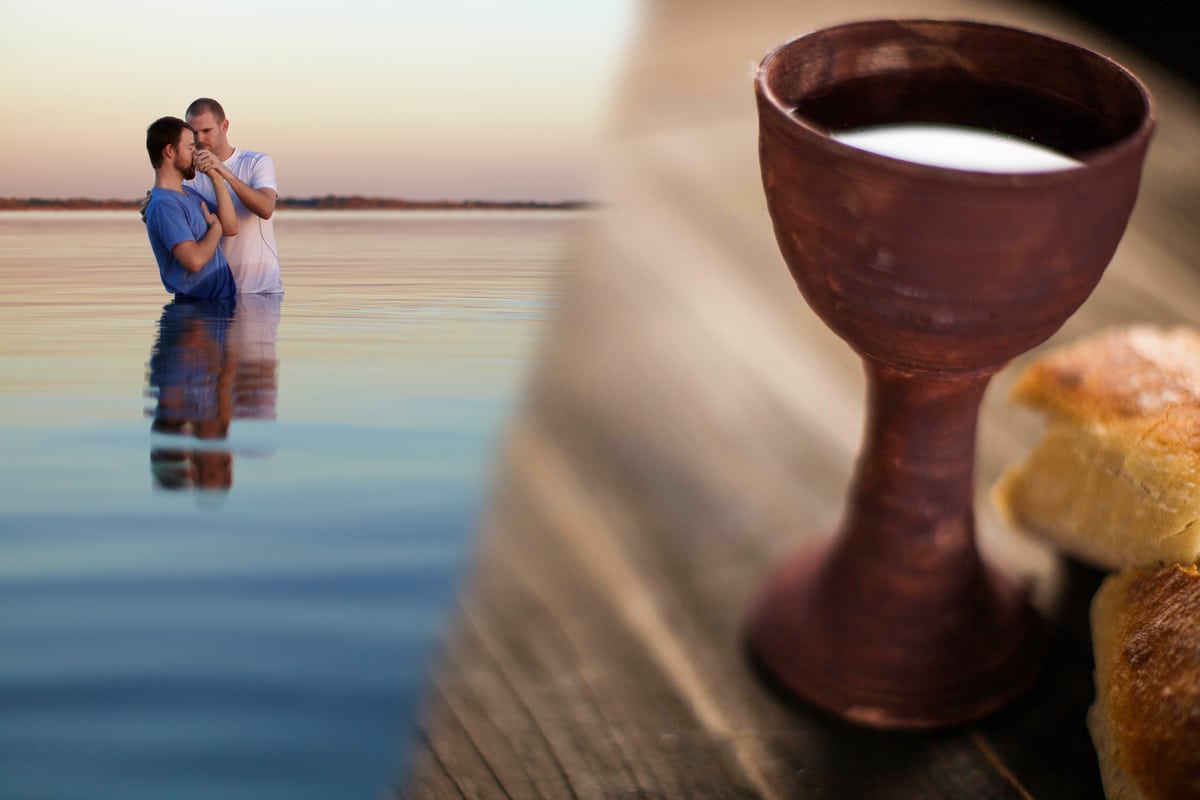The Difference in What Baptists Believe Regarding Sacraments
Observed Ordinances
The word ‘Ordinances’ is one used in Church to describe the important things we observe as part of our faith journey.
For Baptists there are only really two of particular note – Baptism and The Lords Supper (Communion).
Baptism is normally by immersion and for those who have found new life in Christ and seek to declare that by the public profession of their faith. We have baptismal services from time to time and when people request baptism. Those requesting baptism will normally be asked to join in a short course to enable and encourage them to get the most from this ordinance.

At the front area of the church there is a baptismal pool within the platform area and this is accessed by steps going in and out. The water is normally heated so perhaps nearer the temperature of the water in the river Jordan where the first ever baptisms possibly took place and where the Apostle John baptised Jesus.
Communion is normally observed in our church on the first Sunday of each month (this can change depending on the service format and content) and is a linked part of the service with everyone with faith is invited to take part. The criteria is loving God and a willingness to confess our sins before Him and a renewal of our relationship with Him. If we waited till we were perfect and ‘fully Holy’ we would never be able to partake of this sacrement.
BAPTISM (Acts 2:41, Romans 6:3-4, 1 Corinthians 12:13)
The first ordinance of the Baptist church is baptism, Baptists practice Believer’s Baptism.
After a person has placed their faith in Jesus resulting in salvation, they are then baptised by immersion in water.
This ceremony serves as a visible and public declaration of one’s new life in Christ.
It symbolizes Jesus’ death, burial, and resurrection and that of the new Christian, who has died to their old sinful self and been raised up as a new creation.
Baptism identifies the new believer with Christ and with His church. It is one of the first acts of Christian obedience and is required for local church membership.

THE LORD’S SUPPER (Acts 2:42, Matthew 26:26-29, 1 Corinthians 11:23-34)
The second ordinance practiced in Baptist churches is the Lord’s Supper.
This is sometimes referred to as communion. Unlike baptism, which is for individual believers, the Lord’s Supper is for the entire congregation or the community of believers.
Most Baptist churches observe an open communion in which all Christians (including those of other like-minded denominations) are welcome to participate and partake.
There are others, albeit a minority, that practice closed communion by restricting those outside of the local congregation from participating in the service.
Non-Christians should not partake of the Lord’s Supper, and those who do put themselves at physical risk.
The Lord’s Supper was instituted by Jesus Himself. Just a few hours before His arrest, Jesus and His apostles gathered together in the upper room in Jerusalem to celebrate the annual Jewish Passover.
During their meal, Jesus took the bread and compared it to His body which would be broken for them.
Then He blessed it, broke it, distributed it, and they all ate.
Afterwards, He took the cup and compared it to His blood which would be spilled for them.
Again He blessed it, passed it around, and they all drank. Jesus instructed His disciples to continue this ordinance even after He had gone.
Like baptism, the imagery of the Lord’s Supper is symbolic. It graphically illustrates the amazing sacrifice that Jesus made at Calvary in order to pay for the sins of mankind. It is a memorial to Christ’s death on the cross.
As often as it is observed, the Lord’s Supper is to be conducted “in remembrance” of Him.

When those who participate in communion eat the bread and drink the cup, they depict their own personal responsibility for His death. Jesus died for the sins of all people, and therefore everyone mutually is accountable.
The church should observe the Lord’s supper as a proclamation of Christ’s death until He comes again.
Churches often differ slightly in the manner in which they conduct the Lord’s Supper, even among Baptists.
This is due to the fact that no specific, detailed instructions are given in the Bible for it’s administration.
Some churches observe the Lord’s supper weekly, others monthly, and still others once or twice annually.
Most use grape juice to represent Christ’s blood, while others use actual wine.
Most prefer to use unleavened bread, but the Bible doesn’t explicitly require it.
Some distribute the bread and juice individually while others eat from a single loaf and drink from a single cup.
These and other such details are not overly significant, so long as they don’t deter from the meaning of the ceremony.
SACRAMENTS VERSUS ORDINANCES (1 Timothy 1:9, Titus 3:4-7)
Some denominations consider the Lord’s Supper and baptism, along with a few other rituals, to be sacramental.
A sacrament is “an act that conveys the grace of God to an individual”.
Those who hold this view believe that God supernaturally blesses a worshiper as they conduct the act.
According to this doctrine, baptism invokes God’s grace for regeneration and the Lord’s Supper (which they refer to as the Eucharist) conveys God’s grace for ongoing sanctification.
Stated simply, baptism is necessary to initially attain salvation and the regular practice of the Lord’s Supper is necessary to maintain salvation. Following this doctrine, those who neglect partaking of the Eucharist are in danger of committing a mortal sin.


An ordinance, on the other hand, can be defined as “a God-ordained ceremony”.
It is a practice that was commanded and prescribed by the Lord to be observed by the church.
Ordinances do not invoke God’s grace or convey His blessings.
They are simply acts of human obedience to the teachings of scripture.
They are ceremonial re-enactments meant to memorialise Christ, proclaim His salvation, and edify His church.
Baptists, along with several other Protestant denominations, believe that God’s saving grace is poured out fully and sufficiently on the new Christian at the moment that they trust in Jesus for salvation.
Therefore, no additional or continued outpouring of grace is required.
F.A.Q.
Frequently Asked Questions
FAQ’s will be posted here
Ask a Question
